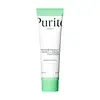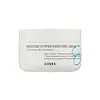What's inside
What's inside
 Key Ingredients
Key Ingredients

 Benefits
Benefits

 Concerns
Concerns

 Ingredients Side-by-side
Ingredients Side-by-side

Water
Skin ConditioningCaprylic/Capric Triglyceride
MaskingMacadamia Ternifolia Seed Oil
EmollientSqualane
EmollientButylene Glycol
HumectantCetearyl Alcohol
EmollientGlycerin
HumectantCentella Asiatica Extract
CleansingNiacinamide
Smoothing1,2-Hexanediol
Skin ConditioningPotassium Cetyl Phosphate
EmulsifyingCeramide NP
Skin ConditioningMadecassic Acid
Skin ConditioningAsiaticoside
AntioxidantAsiatic Acid
Skin ConditioningBehenic Acid
CleansingBetaine
HumectantTromethamine
BufferingButyrospermum Parkii Butter
Skin ConditioningHydrogenated Lecithin
EmulsifyingPalmitic Acid
EmollientStearic Acid
CleansingCaprylyl Glycol
EmollientCandida Bombicola/Glucose/Methyl Rapeseedate Ferment
AntimicrobialCarbomer
Emulsion StabilisingXanthan Gum
EmulsifyingHydroxyethylcellulose
Emulsion StabilisingOryza Sativa Germ Oil
EmollientCocos Nucifera Oil
MaskingSodium Carbomer
Emulsion StabilisingAdenosine
Skin ConditioningPhytosphingosine
Skin ConditioningMyristic Acid
CleansingArachidic Acid
CleansingTremella Fuciformis Extract
HumectantPerilla Ocymoides Seed Extract
AntioxidantSodium Hyaluronate
HumectantBeta-Glucan
Skin ConditioningWater, Caprylic/Capric Triglyceride, Macadamia Ternifolia Seed Oil, Squalane, Butylene Glycol, Cetearyl Alcohol, Glycerin, Centella Asiatica Extract, Niacinamide, 1,2-Hexanediol, Potassium Cetyl Phosphate, Ceramide NP, Madecassic Acid, Asiaticoside, Asiatic Acid, Behenic Acid, Betaine, Tromethamine, Butyrospermum Parkii Butter, Hydrogenated Lecithin, Palmitic Acid, Stearic Acid, Caprylyl Glycol, Candida Bombicola/Glucose/Methyl Rapeseedate Ferment, Carbomer, Xanthan Gum, Hydroxyethylcellulose, Oryza Sativa Germ Oil, Cocos Nucifera Oil, Sodium Carbomer, Adenosine, Phytosphingosine, Myristic Acid, Arachidic Acid, Tremella Fuciformis Extract, Perilla Ocymoides Seed Extract, Sodium Hyaluronate, Beta-Glucan
Water
Skin ConditioningGlycerin
HumectantEthylhexyl Stearate
EmollientVinyldimethicone
Pentylene Glycol
Skin ConditioningCocos Nucifera Oil
Masking1,2-Hexanediol
Skin ConditioningCetearyl Alcohol
EmollientPanthenol
Skin ConditioningPolymethylsilsesquioxane
Arachidyl Alcohol
EmollientPropolis Extract
Skin ConditioningHydroxyethyl Acrylate/Sodium Acryloyldimethyl Taurate Copolymer
Emulsion StabilisingPolyglyceryl-6 Stearate
EmollientButylene Glycol
HumectantCarbomer
Emulsion StabilisingBehenyl Alcohol
EmollientGlyceryl Stearate
EmollientTromethamine
BufferingDimethiconol
EmollientCaprylyl Glycol
EmollientArachidyl Glucoside
EmulsifyingHydrogenated Lecithin
EmulsifyingCeramide NP
Skin ConditioningEthylhexylglycerin
Skin ConditioningXanthan Gum
EmulsifyingSucrose Stearate
EmollientPolyglyceryl-6 Behenate
Emulsion StabilisingSodium Polyacrylate Starch
AbsorbentStearic Acid
CleansingPalmitic Acid
EmollientSodium Hyaluronate
HumectantCholesterol
EmollientHyaluronic Acid
HumectantGlycosphingolipids
EmollientHydrolyzed Hyaluronic Acid
HumectantWater, Glycerin, Ethylhexyl Stearate, Vinyldimethicone, Pentylene Glycol, Cocos Nucifera Oil, 1,2-Hexanediol, Cetearyl Alcohol, Panthenol, Polymethylsilsesquioxane, Arachidyl Alcohol, Propolis Extract, Hydroxyethyl Acrylate/Sodium Acryloyldimethyl Taurate Copolymer, Polyglyceryl-6 Stearate, Butylene Glycol, Carbomer, Behenyl Alcohol, Glyceryl Stearate, Tromethamine, Dimethiconol, Caprylyl Glycol, Arachidyl Glucoside, Hydrogenated Lecithin, Ceramide NP, Ethylhexylglycerin, Xanthan Gum, Sucrose Stearate, Polyglyceryl-6 Behenate, Sodium Polyacrylate Starch, Stearic Acid, Palmitic Acid, Sodium Hyaluronate, Cholesterol, Hyaluronic Acid, Glycosphingolipids, Hydrolyzed Hyaluronic Acid
 Reviews
Reviews

Ingredients Explained
These ingredients are found in both products.
Ingredients higher up in an ingredient list are typically present in a larger amount.
1,2-Hexanediol is a synthetic liquid and another multi-functional powerhouse.
It is a:
- Humectant, drawing moisture into the skin
- Emollient, helping to soften skin
- Solvent, dispersing and stabilizing formulas
- Preservative booster, enhancing the antimicrobial activity of other preservatives
Butylene Glycol (or BG) is used within cosmetic products for a few different reasons:
Overall, Butylene Glycol is a safe and well-rounded ingredient that works well with other ingredients.
Though this ingredient works well with most skin types, some people with sensitive skin may experience a reaction such as allergic rashes, closed comedones, or itchiness.
Learn more about Butylene GlycolCaprylyl Glycol is a humectant and emollient, meaning it attracts and preserves moisture.
It is a common ingredient in many products, especially those designed to hydrate skin. The primary benefits are retaining moisture, skin softening, and promoting a healthy skin barrier.
Though Caprylyl Glycol is an alcohol derived from fatty acids, it is not the kind that can dry out skin.
This ingredient is also used as a preservative to extend the life of products. It has slight antimicrobial properties.
Learn more about Caprylyl GlycolCarbomer is a polymer of acrylic acid. Its main role is to create a gel consistency.
A high amount of carbomer can cause pilling or balling up of products. Don't worry, most products contain 1% or less of carbomer.
Ceramide NP is a type of ceramide and formally known as ceramide 3.
Ceramides are intercellular lipids naturally found in our skin that bonds dead skin cells together to create a barrier. They are known for their ability to hold water and thus are a great ingredient for dry skin.
Ceramides are an important building block for our skin barrier. A stronger barrier helps the skin look more firm and hydrated. By bolstering the skin ceramides act as a barrier against irritating ingredients. This can help with inflammation as well.
If you would like to eat ceramides, sweet potatoes contain a small amount.
Read more about other common types of ceramides here:
Ceramide AP
Ceramide EOP
Cetearyl alcohol is a mixture of two fatty alcohols: cetyl alcohol and stearyl alcohol. It is mainly used as an emulsifier. Emulsifiers help prevent the separation of oils and products. Due to its composition, it can also be used to thicken a product or help create foam.
Cetearyl alcohol is an emollient. Emollients help soothe and hydrate the skin by trapping moisture.
Studies show Cetearyl alcohol is non-toxic and non-irritating. The FDA allows products labeled "alcohol-free" to have fatty alcohols.
This ingredient is usually derived from plant oils such as palm, vegetable, or coconut oils. There is debate on whether this ingredient will cause acne.
Due to the fatty acid base, this ingredient may not be Malassezia folliculitis safe.
Learn more about Cetearyl AlcoholCocos Nucifera Oil is obtained from the kernels of the coconut fruit. In other words, this is coconut oil.
Coconut Oil is rich in fatty acids with lauric acid making up the majority of these. It also contains linoleic acid. Due to this high fatty acid content, coconut oil helps trap moisture and soften skin.
Despite being antibacterial, coconut oil may not be great for acne-prone skin. It is comedogenic and may clog pores. This ingredient may not be safe for malassezia or fungal acne.
Note: Coconut Oil should not replace your sunscreen for UV protection. Studies show it only blocks about 20% of UV.
This oil is non-volatile and has a light scent.
The term 'fragrance' is not regulated in many countries. In many cases, it is up to the brand to define this term. For instance, many brands choose to label themselves as "fragrance-free" because they are not using synthetic fragrances. However, their products may still contain ingredients such as essential oils that are considered a fragrance.
Learn more about Cocos Nucifera OilGlycerin is already naturally found in your skin. It helps moisturize and protect your skin.
A study from 2016 found glycerin to be more effective as a humectant than AHAs and hyaluronic acid.
As a humectant, it helps the skin stay hydrated by pulling moisture to your skin. The low molecular weight of glycerin allows it to pull moisture into the deeper layers of your skin.
Hydrated skin improves your skin barrier; Your skin barrier helps protect against irritants and bacteria.
Glycerin has also been found to have antimicrobial and antiviral properties. Due to these properties, glycerin is often used in wound and burn treatments.
In cosmetics, glycerin is usually derived from plants such as soybean or palm. However, it can also be sourced from animals, such as tallow or animal fat.
This ingredient is organic, colorless, odorless, and non-toxic.
Glycerin is the name for this ingredient in American English. British English uses Glycerol/Glycerine.
Learn more about GlycerinHydrogenated Lecithin is created from the hydrogenation of lecithin (a group of phospholipids). Hydrogenation is a chemical reaction between hydrogen and another element.
This ingredient is an emollient and emulsifier. As an emollient, it helps soften skin by trapping moisture within. As an emulsifier, it prevents oil and water ingredients from separating.
Palmitic Acid is a fatty acid naturally found in our skin and in many plant and animal sources. In cosmetics, it is usually derived from palm oil. It serves many purposes in skincare, acting as a cleanser, emollient, and emulsifier.
As an emollient, palmitic acid helps soften and smooth the skin by preventing water loss. In cleansers, it helps remove oil and dirt while creating foam.
Its emulsifying properties help stabilize products by keeping water and oil-based ingredients from separating.
This may not be suitable for fungal acne-prone skin, as fatty acids like this can sometimes trigger breakouts in sensitive individuals.
Learn more about Palmitic AcidSodium Hyaluronate is hyaluronic acid's salt form. It is commonly derived from the sodium salt of hyaluronic acid.
Like hyaluronic acid, it is great at holding water and acts as a humectant. This makes it a great skin hydrating ingredient.
Sodium Hyaluronate is naturally occurring in our bodies and is mostly found in eye fluid and joints.
These are some other common types of Hyaluronic Acid:
Learn more about Sodium HyaluronateStearic Acid is a fatty acid. It is an emollient, emulsifier, and texture enhancer.
As an emollient, stearic acid helps soften skin. It aids the skin's protective barrier by preventing water loss. It also provides a gentle cleansing effect without stripping away natural oils.
Stearic acid may also be used to enhance the texture of products. It can add volume and stabilize ingredients such as water and oil. This can help water and oil ingredients from separating.
Sources of stearic acid include animal or vegetable fats/oils such as coconut or shea. It can be naturally found in butter, cocoa butter, shea butter, vegetable fats, and animal tallow.
This ingredient may not be Malassezia folliculitis, or fungal-acne safe.
Learn more about Stearic AcidTromethamine helps balance the pH and improve the texture of a product. It is synthetically created.
As an emulsifier, Tromethamine prevents oil and water ingredients from separating. This helps stabilize the product and elongate a product's shelf life. Tromethamine also makes a product thicker.
Tromethamine helps balance the pH level of a product. Normal pH level of skin is slightly acidic (~4.75-5.5). The acidity of our skin is maintained by our glands and skin biome. Being slightly acidic allows our skin to create an "acid mantle". This acid mantle is a thin barrier that protects our skin from bacteria and contaminants.
Oral Tromethanmine is an anti-inflammatory drug but plays the role of masking, adding fragrance, and/or balancing pH in skincare.
1,3-Propanediol, 2-amino-2-(hydroxymethyl)-
Learn more about TromethamineWater. It's the most common cosmetic ingredient of all. You'll usually see it at the top of ingredient lists, meaning that it makes up the largest part of the product.
So why is it so popular? Water most often acts as a solvent - this means that it helps dissolve other ingredients into the formulation.
You'll also recognize water as that liquid we all need to stay alive. If you see this, drink a glass of water. Stay hydrated!
Learn more about WaterXanthan gum is used as a stabilizer and thickener within cosmetic products. It helps give products a sticky, thick feeling - preventing them from being too runny.
On the technical side of things, xanthan gum is a polysaccharide - a combination consisting of multiple sugar molecules bonded together.
Xanthan gum is a pretty common and great ingredient. It is a natural, non-toxic, non-irritating ingredient that is also commonly used in food products.
Learn more about Xanthan Gum